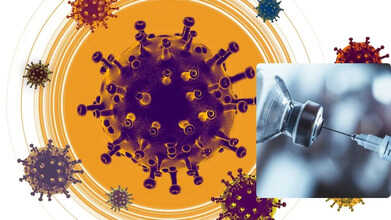- Health Conditions A-Z
- Health & Wellness
- Nutrition
- Fitness
- Health News
- Ayurveda
- Videos
- Medicine A-Z
- Parenting
Is The ‘Frankenstein’ COVID Variant The Most Vaccine-Resistant Strain Yet?

Credits: CANVA
The Stratus strain, also known as the ‘Frankenstein’ variant, belongs to the SARS-CoV-2 XFG and XFG.3 lineages and has been spreading swiftly across the United Kingdom, with evidence suggesting it is also circulating globally. According to recent data from the UK Health Security Agency (UKHSA), these variants now account for nearly 30 percent of all COVID-19 cases in England, with XFG.3 emerging as the most dominant strain.
In recent weeks, medical experts have voiced concerns that the Stratus variant might have the ability to partially evade immunity built through vaccination, potentially increasing infection risks across all age groups.
What Sets the Stratus or ‘Frankenstein’ Variant Apart?
One of the unusual symptoms linked to this strain is a hoarse or raspy voice, which doctors say was rarely reported with previous variants. “Unlike earlier strains, Stratus carries specific mutations in its spike protein that may allow it to slip past antibodies formed through prior infection or vaccination,” explained Dr. Kaywaan Khan, a Harley Street general practitioner and founder of the Hannah London Clinic.
Is the Stratus Variant More Transmissible?
The XFG or Stratus strain is a member of the Omicron family and is a hybrid of two subvariants, LF.7 and LP.8.1.2. This combination of genetic material helps the virus attach more tightly to human cells, making it potentially more contagious. Like other variants, it also contains several mutations that may enhance its ability to evade antibodies produced either through infection or vaccination.
Could The ‘Frankenstein’ Variant Be The Most Vaccine-Resistant?
Early reports from health authorities suggest that existing COVID-19 vaccines still provide a degree of protection against the Stratus variant. Vaccines designed for earlier strains continue to reduce the risk of severe illness and hospitalization across multiple variants, and experts remain cautiously hopeful that they will do the same against Stratus. However, studies are ongoing to determine how much protection current vaccines actually provide against this specific strain.
As the situation develops, public health recommendations may change. Officials are urging people to follow reliable updates and continue to follow safety advice. Vaccination appointments remain widely available in the UK, and eligible individuals are encouraged to receive their doses or boosters as recommended.
What Are the Symptoms of Stratus?
The most common symptom so far appears to be a sore throat, though overall, the symptoms are similar to those caused by other COVID-19 variants. People infected with Stratus may experience:
- Fever
- Fatigue
- Cough
- Sneezing
- Runny or congested nose
- Nausea, vomiting, or diarrhea
So far, XFG has not been linked to more severe illness compared to previous variants, and hospitalization rates have not shown a sharp increase, which is reassuring.
Why The Stratus Variant Still Deserves Attention
Although it does not appear to cause more severe disease, the Stratus variant is a reminder that COVID-19 continues to evolve. Vaccines remain the strongest line of defense, and researchers are continuing to study how well they perform against this strain. Staying informed through credible sources and following updated health guidance can help limit the spread and keep communities safer.
Weight Loss Jabs: What Happens To Your Body When You Stop Taking Them?

Credits: Canva
Weight-loss jabs, or GLP-1 receptor agonists, have provided many people with results that diets alone could not achieve. For those struggling with constant cravings, these medications have quieted the persistent “food noise” that often drives overeating. They have transformed not only body shapes but also self-confidence and daily habits.
Yet questions remain: can people safely stop taking these drugs, and what happens to the body when they do? These are still largely unknown, as the drugs are relatively new. GLP-1s mimic a natural hormone that controls hunger, but the long-term effects are only beginning to be understood. Additionally, for the estimated 1.5 million people in the UK paying privately for these injections, maintaining treatment can be costly.
Two women, Tanya and Ellen, share their personal experiences with the BBC on weight-loss jabs and what life was like when they attempted to stop.
Weight Loss Jabs: Tanya Hall’s Experience
Tanya, a sales manager in the fitness industry, initially started taking Wegovy to challenge her own perceptions about weight and authority. She often felt overlooked or undervalued because of her size, and hoped that losing weight would change how others treated her, as per BBC.
Early in treatment, Tanya experienced side effects including nausea, headaches, sleep issues, and hair loss, which she describes as clumps coming out. Despite this, she steadily lost weight—six stone (38 kg) over 18 months—and the injections quieted the relentless urge to eat.
However, every time she tried to stop, her appetite surged within days, leaving her horrified at her own eating. Now, Tanya continues the medication, feeling it has become essential to maintaining her weight and the confidence it brings.
Weight Loss Jabs: What Happens To Your Body When You Stop Taking Them?
Wegovy’s manufacturer, Novo Nordisk, stresses that treatment decisions should be made with medical guidance and that side effects must be considered. Lifestyle GP Dr. Hussain Al-Zubaidi likens stopping GLP-1s abruptly to being hit by a “tsunami” of hunger.
Research shows that within one to three years of stopping these medications, people can regain 60–80% of the weight they lost. This highlights how these drugs work not just by reducing appetite temporarily but by fundamentally altering hunger cues.
Weight Loss Jabs: Ellen Ogley’s Journey
Ellen turned to Mounjaro after reaching a critical point in her life. Her weight had put her at risk during surgery, and emotional binge eating dominated her daily habits. Once on the medication, Ellen noticed her compulsive eating completely stopped.
Over 16 weeks, she lost 3 st 7 lb (22 kg) and began tapering off the injections over six weeks. She focused on developing a healthier relationship with food, creating balanced meals, and incorporating exercise into her routine. Despite some weight creep after stopping, she has since lost a total of 51 kg and now feels confident her habits are sustainable.
Weight Loss Jabs: The Importance of Support
Dr. Al-Zubaidi emphasizes that exiting GLP-1 treatment safely requires guidance and long-term support. NICE recommends at least a year of tailored advice after stopping injections to help individuals maintain their weight and prevent relapse, as per BBC.
For patients paying privately, such structured support may not always be available, increasing the risk of regaining weight. Lifestyle, mindset, and environmental factors play a significant role in long-term outcomes.
Tanya has chosen to continue with her medication, aware of the pros and cons, while Ellen has closed that chapter and built a sustainable routine for life after Mounjaro.
Weight-loss jabs can dramatically change appetite and body weight, but stopping them can be challenging. The transition off these drugs requires careful planning, support, and lifestyle adjustments. As Tanya and Ellen’s experiences show, the journey varies by individual, and long-term strategies are essential to maintaining health and weight loss results.
Eli Lilly, the manufacturer of Mounjaro, states that patient safety is its top priority and that it continually monitors and reports information on treatment outcomes to regulators and prescribers.
Flu Cases Surge Across The US: How Long Does The Super Flu Remain Contagious?

Credits: Canva
Flu Symptoms: Seasonal infections are spreading across the United States just as the holiday travel rush gets underway, worrying health officials about fresh spikes during family get-togethers. Flu and norovirus cases are rising in several states, while COVID-19 continues to circulate at lower but consistent levels. Together, these illnesses are adding strain on hospitals as millions of people plan to travel in the days ahead.
Flu: What Is Super Flu?
“Super flu” is not a clinical term, but it is often used to describe a flu season that feels more aggressive or spreads faster than usual. This is typically linked to a dominant strain of influenza A. The current surge is being driven by a mutated influenza A strain known as H3N2 subclade K. Health officials say this strain has become the leading flu variant in the US, accounting for roughly 89 percent of H3N2 samples analysed since late September, according to genetic sequencing data from the Centers for Disease Control and Prevention (CDC).
This variant emerged after the 2025–26 flu vaccine was formulated, meaning the vaccine may not be as closely matched as in earlier seasons. While the shot still offers protection against severe disease, experts note that the mismatch could allow the virus to spread more easily.
Flu Symptoms 2025: What Symptoms Should People Watch For?
The symptoms seen in the current flu wave are largely familiar. People may develop fever, chills, extreme tiredness, cough, and body aches. Doctors, however, caution that the wider spread could result in more serious cases, particularly among people who are at higher risk.
CDC estimates indicate that the US has already seen about 4.6 million flu cases this season, along with nearly 49,000 hospital admissions and around 1,900 deaths. Flu activity increased sharply in mid-December, with test positivity jumping from 8.1 percent to 14.3 percent within a single week.
Flu Symptoms 2025: How To Reduce The Risk
Doctors recommend staying home when feeling unwell, washing hands often, especially to limit norovirus spread, and considering vaccination against flu and COVID-19. Even when the strain match is not ideal, experts stress that vaccines remain crucial in reducing the risk of severe illness, hospitalisation, and death.
Flu Cases In The US: How Contagious Is Superflu?
In terms of how easily it spreads, it behaves much like regular flu, which is known to be highly contagious.
Someone with flu can pass on the virus from around one day before symptoms appear and continue to be contagious for five to seven days after becoming sick. Children, older adults, and those with weakened immune systems may remain infectious for a longer period.
The virus mainly spreads through respiratory droplets released when an infected person coughs, sneezes, speaks, or breathes near others. It can also spread through contact with contaminated surfaces, followed by touching the mouth, nose, or eyes. Crowded indoor settings, poor airflow, and close contact make transmission far more likely, which explains why flu spreads quickly during peak season.
What makes a so-called “super flu” seem more contagious is not a new way of spreading, but higher case numbers, quicker community transmission, and stronger symptoms, all of which increase coughing, fever, and the amount of virus released.
These 3 Persistent Changes In Your Feet May Be A Sign Of High Cholesterol

Credits: Canva
Raised cholesterol levels do more than strain the heart. They can sharply limit blood circulation to the arms and legs, increasing the risk of serious health problems. High cholesterol is already known to raise the chances of heart attacks and strokes, which makes recognising early warning signs especially important.
Low-density lipoprotein, commonly known as LDL or “bad” cholesterol, builds up along artery walls. Over time, this build-up narrows the blood vessels and increases the likelihood of blockages that can lead to cardiac arrest. According to the NHS, diets high in fatty foods, frequent alcohol intake, and a lack of physical activity are among the main reasons cholesterol levels rise.
Why Symptoms May Appear in the Feet
Although cholesterol is often detected through medical tests, warning signs can sometimes surface in unexpected parts of the body, including the feet. Paying attention to these changes can help doctors identify peripheral artery disease, or PAD, which develops when fatty deposits restrict blood flow. This has been reported by Surrey Live.
The British Heart Foundation explains that as circulation worsens, the body struggles to supply enough oxygen, nutrients, and blood to the skin and surrounding tissues. This problem is most noticeable in the feet, as they are the farthest point from the heart.
Three Serious Foot Symptoms Linked to High Cholesterol
There are three major signs of high cholesterol that may show up in the feet:
- Pain
- Ulcers
- Gangrene
Other PAD Symptoms to Look Out For
People with peripheral artery disease may also notice additional changes, such as:
* Loss of hair on the legs or feet
* Weakness or numbness in the legs
* Toenails that grow slowly or become brittle
* Open sores on the feet or legs that take a long time to heal
* Changes in skin colour, including pale or bluish tones
* Skin that looks shiny
* Erectile dysfunction in men
* Loss of muscle mass in the legs
Lowering cholesterol levels is essential to reduce the risk of PAD and other complications associated with high cholesterol.
It is important to confirm high cholesterol with a healthcare professional, as many people experience few or no symptoms.
A blood test remains the most reliable way to detect high cholesterol, which often goes unnoticed without screening.
When Symptoms Become an Emergency
Symptoms such as foot pain, ulcers, and gangrene may signal a severe form of PAD known as critical limb ischaemia. The British Heart Foundation warns that this condition needs urgent medical treatment to help prevent limb loss.
If a doctor suspects high cholesterol, the NHS advises that a blood test will usually be recommended.
How Cholesterol Is Tested
There are two main ways cholesterol levels can be checked:
* A blood sample taken from the arm
* A finger-prick test
If results confirm high cholesterol, a GP will talk through ways to bring levels down, which may include changes to diet or prescribed medication.
Diet Changes That Can Help
Adjusting what you eat is often one of the most effective ways to reduce cholesterol, as diet is a common cause of high levels. One practical step is to cut back on saturated fats and replace them with unsaturated fats.
Saturated fats are commonly found in foods such as fatty cuts of meat, butter, cheese, and lard. Unsaturated fats, on the other hand, are present in vegetables, nuts, seeds, and plant-based oils.
Apart from that, increasing physical activity can also help manage cholesterol and support overall heart health.
UK health guidelines recommend that adults aim for at least 150 minutes of moderate-intensity activity each week, or 75 minutes of vigorous exercise. Doing more activity, or increasing intensity, can reduce the total time needed. Moderate exercise means your heart rate rises and breathing becomes heavier, but you should still be able to talk without struggling for breath.
One practical way to reach the 150-minute target is to stay active for 30 minutes a day, on at least five days each week.
© 2024 Bennett, Coleman & Company Limited

